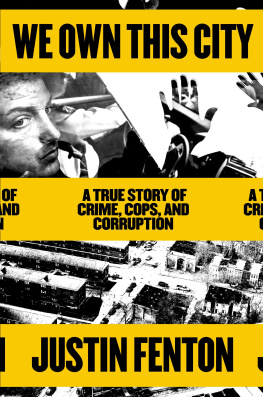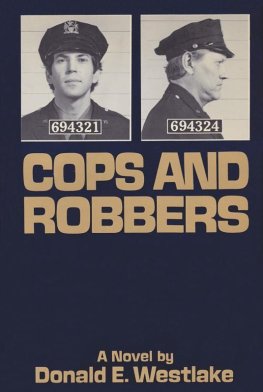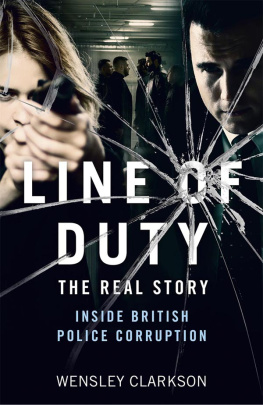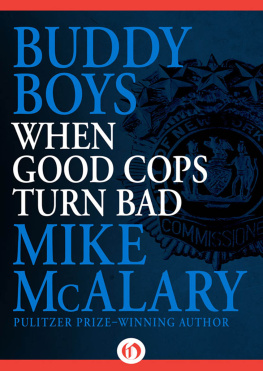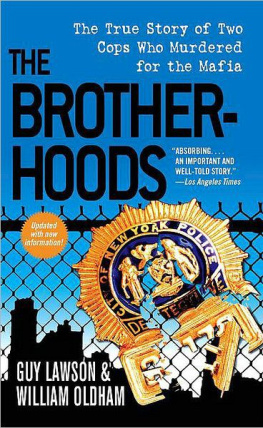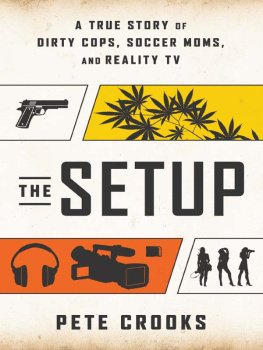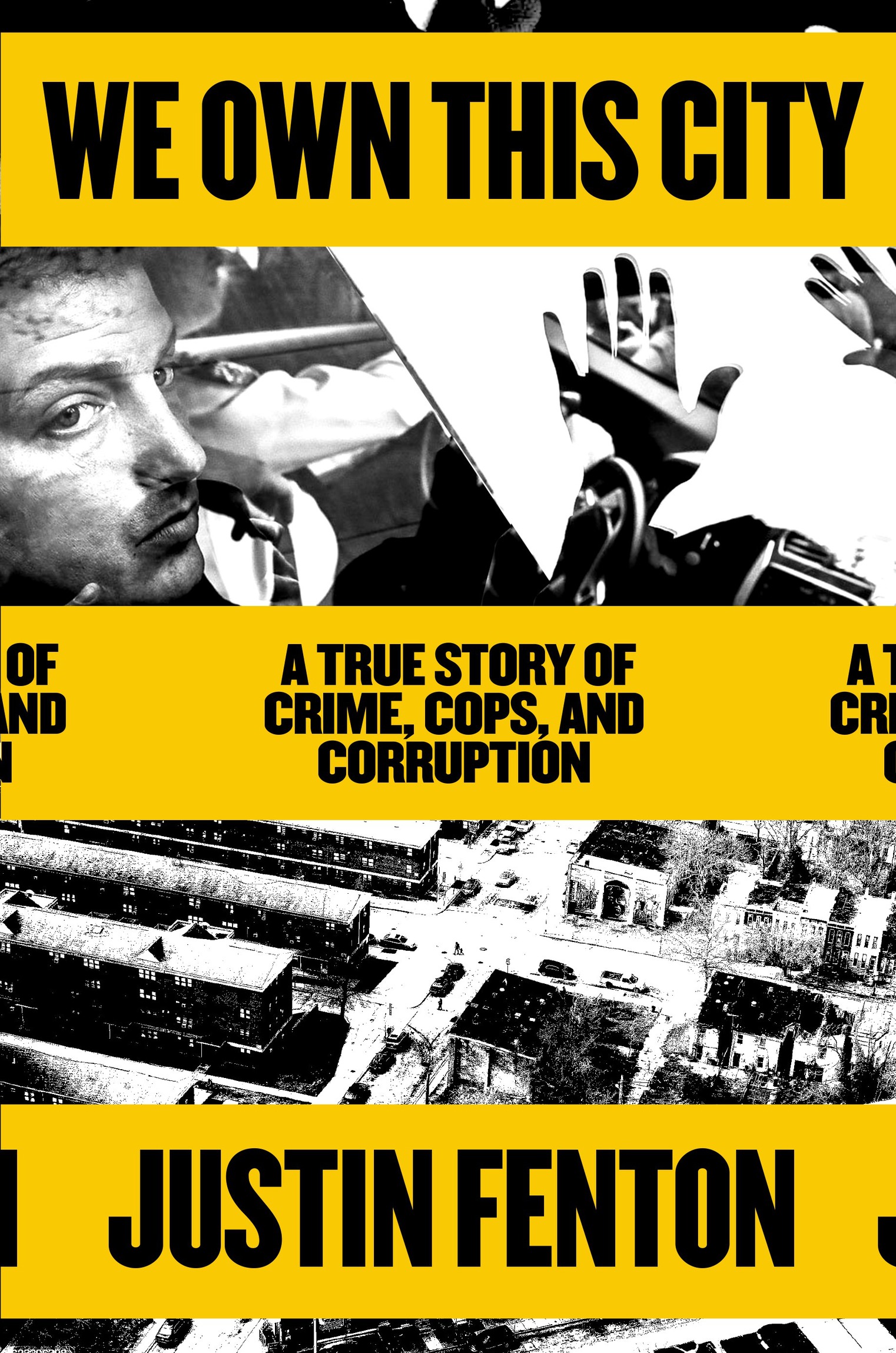Contents
Landmarks
Print Page List
We Own This City is a work of nonfiction. Some names and identifying details have been changed.
Copyright 2021 by Justin Fenton
All rights reserved.
Published in the United States by Random House, an imprint and division of Penguin Random House LLC, New York.
Random House and the House colophon are registered trademarks of Penguin Random House LLC.
Library of Congress Cataloging-in-Publication Data
Names: Fenton, Justin, author.
Title: We own this city : a true story of crime, cops, and corruption / Justin Fenton.
Description: First edition. | New York : Random House, [2021] | Includes bibliographical references and index.
Identifiers: LCCN 2020020879 (print) | LCCN 2020020880 (ebook) | ISBN 9780593133668 (hardcover ; alk. paper) | ISBN 9780593133675 (ebook)
Subjects: LCSH: Jenkins, Wayne, 1980 | Baltimore (Md.). Police DepartmentCorrupt practicesCase studies. | Police corruptionMarylandBaltimoreCase studies. | Drug trafficMarylandBaltimoreCase studies. | RacketeeringMarylandBaltimoreCase studies. | CrimeMarylandBaltimoreCase studies.
Classification: LCC HV8148.B2 F46 2021 (print) | LCC HV8148.B2 (ebook) | DDC 364.1/323097526dc23
LC record available at https://lccn.loc.gov/2020020879
LC ebook record available at https://lccn.loc.gov/2020020880
Ebook ISBN9780593133675
randomhousebooks.com
Book design by Edwin Vazquez, adapted for ebook
Cover design: No Ideas
Cover photographs: Shawn Hubbard (face); Patrick Smith/Getty Images (city)
ep_prh_5.6.1_c0_r0
Contents
LIST OF CHARACTERS
THE INVESTIGATED
Sergeant Wayne Jenkins
Detective Momodu Gondo
Detective Evodio Hendrix
Detective Daniel Hersl
Detective Marcus Taylor
Detective Maurice Ward
Sergeant Thomas Allers
Sergeant Keith Gladstone
THE INVESTIGATORS
Assistant U.S. Attorney Leo Wise
Assistant U.S. Attorney Derek Hines
Special Agent Erika Jensen
Sergeant John Sieracki
Corporal David McDougall
Detective Scott Kilpatrick
THE DECEASED
Detective Sean Suiter

THE LETTER ARRIVED IN the chambers of a federal judge in Baltimore in the summer of 2017. It had been sent from the McDowell Federal Correctional Institution, which was nestled in the middle of nowhere, West Virginia, more than six hours from Baltimore. On the front of the envelope, the inmate had written: Special mail.
Umar Burley had written his letter on lined notebook paper, in neat, bouncy print, using tildes to top his Ts. Burley, inmate number 43787-037, was reaching out to the judge for a second time, begging for a court-appointed lawyer. His attorney had retired, and attempts to reach another had gone unanswered.
Could you imagine how hard it is to be here for a crime I didnt commit and struggling to find clarity and justice on my own? Burley wrote.
Months earlier, Burley had been in the recreation hall of a federal prison in Oklahoma, awaiting transportation to McDowell, when someone called to him: Little Baltimore! Little Baltimore! Did you see that? News from home flashed across the television screen: A group of eight Baltimore police officers had been charged with stealing from citizens and lying about their cases. The officers had carried out their alleged crimes undeterred by the fact that the police department was at the time under a broad civil rights investigation following the death of a young Black man from injuries sustained while in police custody. The revelations were breathtaking, though not entirely unbelievable: For years, accusations of misconductfrom illegal strip searches to broken boneshad been leveled against city police. But many claims lacked hard proof and came from people with long rap sheets and every incentive to level a false accusation. Such toss-ups tended to go in favor of the cops. With the deck so stacked against them, most victims didnt even bother to speak up. Often, they did have drugs or guns, and the fact that the cops lied about the details of the encounter or took some of the seized money for themselves, well, in Baltimore, it was a dirty game in which the ends justified the means.
But now a wiretap case back home was shining a light on the culture of the force, and the federal prosecutors who brought the charges were looking for more victims. And Umar Burley had a story to tell.
BURLEYS STORY BEGINS ON the morning of April 28, 2010. Members of a plainclothes police squad had been summoned for an ad hoc roll call on the street. Their sergeant, running a little late, told them to stay put. But Detective Wayne Jenkins felt the itch. He told the others that the area around Belle Avenue, in Northwest Baltimore, was hot with reports of criminal activity.
Lets go, Jenkins said.
You can tell some police officers to stand under a pole for ten hours. Check nine hours later, theyll still be there. Send them to Greenmount Avenue and order them to walk up and down the boulevard, and theyll pace until the soles of their shoes begin to wear thin. But others need to get into something. They want to sit in vacant houses peering through binoculars or chase suspects through alleys; they work ungodly amounts of overtime. These are the 10 percent whom commanders in the Baltimore Police Department (BPD) rely on to get the job done.
These are also the officers most likely to make up the plainclothes units known around town as knockers or jumpout boys, a reference to their aggressive tactics. Officers in plainclothes units often operate in the shadows of a police department. Their work is not to be confused with undercover operations, in which police officers assume a different identity and worm their way into a criminal organization. Plainclothes officers, as the description suggests, work in street clothes rather than uniforms. They drive unmarked vehicles. They are not typically tethered to specific posts or obligated to respond to 911 calls. Instead, they go out looking for illegal activitypeople selling drugs or displaying bulges under clothing that could be gunsand they operate with a great deal of independence. They can let a suspect go if they think the suspect can lead them to bigger fish. Across the country, these plainclothes squads have often been where scandals are born, but police department leaders over the years have deemed them critical to the crime fightthey are the Vikings who go out into the field and return with a bounty, as one Baltimore chief would later put it.
Jenkins seemed perpetually in motion, and his gung-ho attitude quickly won the white former marine early entry into the BPDs most elite units. By 2010, less than seven years into his time on the force, Jenkins had worked his way into a new violent repeat offender squad, a handpicked group of officers whose charge was to go after Baltimores worst offenders. They would often be given names of elusive suspected criminals and allowed only thirty days to build their best case.

